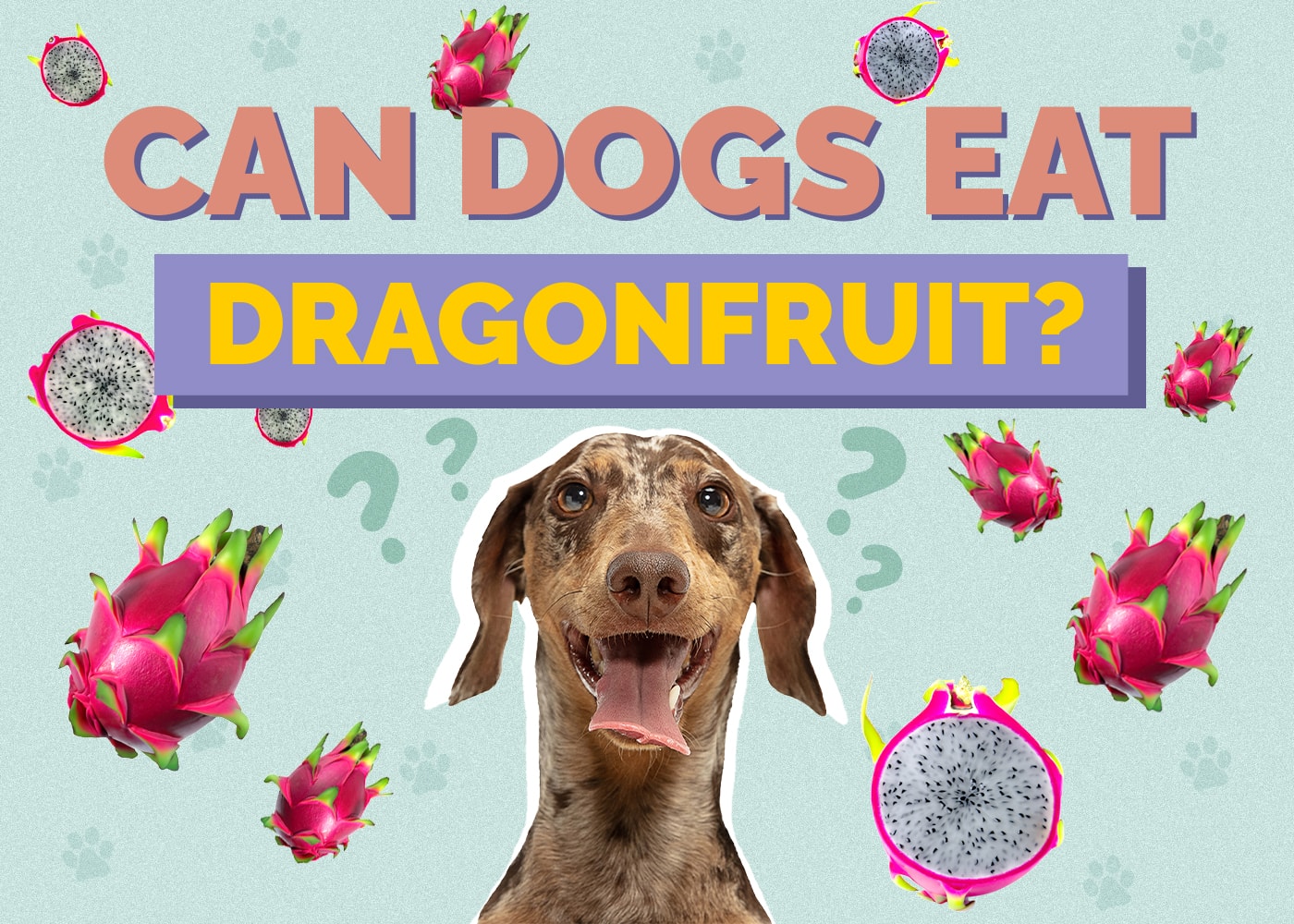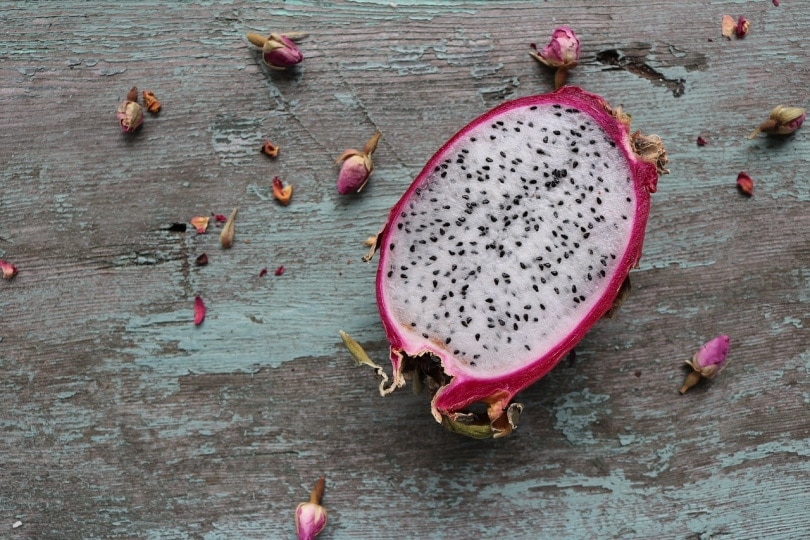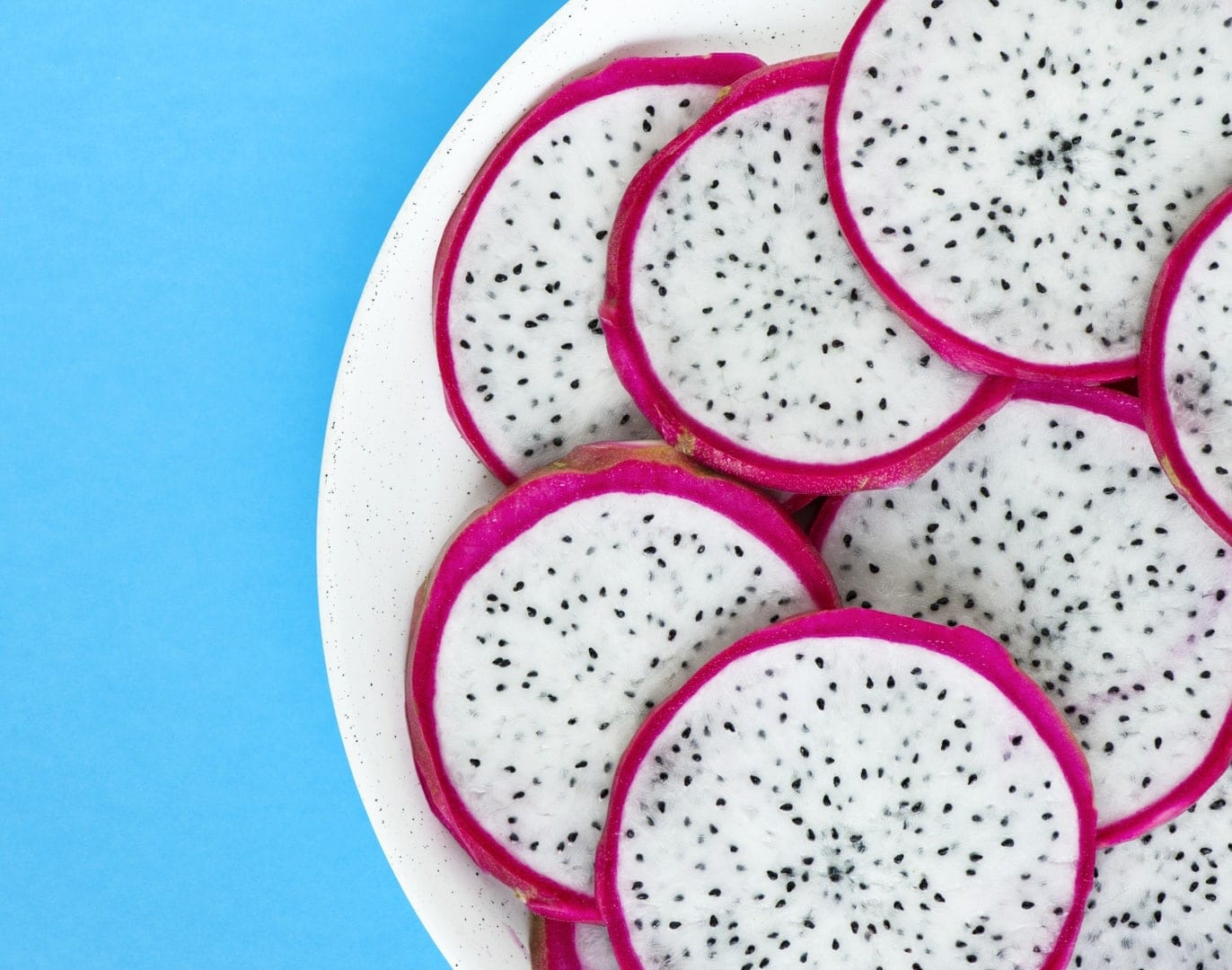Can Dogs Eat Dragon Fruit? Is Dragon Fruit Safe for Dogs?

Updated on

In case you are frantically googling dragon fruit because your pup just wolfed some down while you weren’t looking — relax! Dogs can eat dragon fruit. Neither white, red, nor yellow-fleshed dragon fruit is toxic to our canine friends.
Yes, dragon fruit is safe for dogs to eat. But the question then becomes: should dogs eat dragon fruit? In this article, we’re going to go into nutrition and possible health benefits, as well as ways that dragon fruit can be bad for a dog.
Dragon Fruit Nutrition and Fun Facts
Pink, green, pointy, kind of scaly, and sitting unobtrusively in the produce section… just what the heck are these crazy alien fruits anyway?
Dragon fruit refers to the fruit of several cactus species native to the Americas. The fruit from the Stenocereus cactus is sour, juicy, and refreshing. They were an important staple food for indigenous peoples of the arid regions of the Americas.
Pitaya from the Hylocereus cactuses are sweeter, squishier, and come in three colors: pitaya blanca (white), pitaya roja (red), and pitaya amarilla (yellow).
These weird but tasty fruits are grown in tropical and subtropical regions in Florida, Mesoamerica, the Caribbean, Southeast Asia, and Australia.

Health Benefits of Dragon Fruit for Dogs
While it is not advisable to allow your pup to eat dragon fruit in excess, moderate amounts of these wacky looking fruits are healthy in a variety of ways.
Dragon fruit is rich in vitamins and minerals including calcium, iron, and vitamin C.
Vitamin C
Vitamin C is an antioxidant, has anti-inflammatory properties, and can even help maintain cognitive functioning. Unlike humans, dogs can synthesize their own vitamin C. But a little extra can provide a boost to the immune system, and any excess will simply pass through their system.
Iron and Calcium
Proper calcium levels are an integral part of keeping your dog fit, happy, and playing all day long! As most people know, calcium is an essential nutrient in bone growth and skeletal development. So, a bit of dragon fruit occasionally will actually help your pup’s bones stay strong.
Additionally, calcium can support heart and nerve functioning, normal blood clotting, and even muscular health.
A regular intake of whole foods with iron in them, like dragon fruit, have great long-term health benefits for your dog. Healthy iron levels help produce and develop red blood cells, which perform critical functions like transporting oxygen to the body.
Robust red blood cells will prevent issues like anemia and fatigue.
Fatty Acids
The seeds of dragon fruit are also super high in fatty acids that are an essential part of your dog’s nutrition. They are especially high in linoleic acid, or omega-6s, which are one of the few fatty acids that canine bodies cannot synthesize themselves and must get from their diet.
A balance of fatty acids can support joint functioning, skin and hair health, and even brain development!
Can Dragon Fruit Be Bad for Dogs?

All that great stuff being said about dragon fruit, it is only recommended in moderation.
It’s deliciously sweet and makes an excellent summertime snack. But keep it as a snack or treat, and don’t overdo it because dragon fruits are high in sugar. Excessive sugar intake is dangerous for your canine companion in many ways.
Digestive System
Some dogs have more sensitive digestive systems than others. Depending on your pup’s gastrointestinal health, large amounts of sugary foods can upset their stomachs, or cause irregular and loose stools.
Teeth
Anyone who has ever needed a cavity filled knows that sugar can seriously damage your teeth. Just like humans, a dog who eats too much sugar is far more susceptible to tooth decay and gum disease. Sugary snacks like dragon fruit should be an occasional treat, no matter how big a sweet tooth your dog has!
Obesity
Large amounts of sugar in a dog’s diet can also contribute to unhealthy weight gain and obesity. Obesity puts stress on a dog’s heart, joints, and energy levels. If you’re worried about your dog’s weight or see a decline in activity along with weight gain contact your veterinarian.
Hair and Skin
Too much sugar can lead to poor skin and hair health for your dog. Sugars can disrupt the endocrine system, making it harder for it to secrete the necessary hormones vital to healthy hair and skin production. It can even cause your poor pup’s hair to fall out!

How to Feed Dragon Fruit to Your Dogs
The best way to let your dog eat dragon fruits is also the simplest — fresh and au naturel! Cut the dragon fruit into a smaller piece, and let your pup try the soft flesh. Some dogs are deterred by the odd, mushy texture and your dog may not be interested in eating more after a little taste.
But if your furry friend enjoys their treat, consider slicing off the pink, leathery skin before giving them more. The skin is not edible and may cause digestive upset. And some dogs just don’t know when to stop munching!
Do not cook, season, or otherwise prepare this delightful tropical treat. A dog’s digestive system rarely does well with the spices and sauces that humans love, so it is best to avoid altogether.
Can Puppies Eat Dragon Fruit?
Yes, puppies can also eat dragon fruit. However, give a puppy even less of this sugary treat than you might an adult dog. Puppy bellies are more sensitive to sugars and new foods, so just a little taste or you may have some serious carpet cleaning to do later!

Final Thoughts on Feeding Dragon Fruit to Your Dog
So, can dogs eat dragon fruit? Yes! Should they on a regular basis? Probably not.
Small amounts of these sweet, tropical fruits can confer numerous health benefits to your four-legged friend. But too much can lead to health issues with immediate and potentially long-term effects.
Next time you bring one of these strange cactus fruits home, let your pup try a bite. If they like it, check in with your veterinarian and see what they consider an appropriate portion size and frequency. You’ll be lounging poolside with your dog and enjoying this tropical treat in no time!
See also:
Featured Image: Pexels












